Andrew Collins's Blog, page 20
July 9, 2013
Wanna see something really scary?
Then this is the Telly Addict for you. It’s got Luther on BBC1, which, if you didn’t see the first episode, is now officially the more terrifying programme on TV. They’ve rustled up a serial killer who makes The Fall‘s Paul Spector look like a nice family man who isn’t actually a serial killer; also, while we’re on “scary”, there are honorable mentions for The Returned on C4 and The Walking Dead, whose third season, the one with David Morrissey, has just transferred from Fox to Channel 5; on a lighter note, Dates on C4, which came to an end last week; and the surprisingly grown up, valedictory Skins: Fire on E4, from Bryan Elsley, who’s also the creator of Dates (clever man, with a clever son, Jamie Brittain, who wrote my fave Date with the great Greg McHugh, and a clever daughter, Jess Brittain, who’s writing the first Skins story); a summary dismissal of ABC’s Scandal, whose second season came to fail to fill the gap left by The Good Wife and Nashville on More4 (sorry!); plus a moment of Zen from BBC2’s superb Route Masters.


July 8, 2013
In a field of its own

We are gathered here today to celebrate what I’m going to have to go out on a critical limb and call “the genius” of Ben Wheatley. I have never met the man – although I’d like to – but his work has given me much to chew on since making his no-budget debut in 2009 with Down Terrace. I’m man enough to admit that I didn’t see this at the time, but the sizzle it created drove me to Kill List in 2011, which sealed the deal. (And I’ve seen Down Terrace since, on the telly, which is herewith significant. This means I have discovered Wheatley in the wrong order, but I plan to atone for that sin.)
A Field In England comes only about seven months after the aggressively marketed release of Sightseers, one of my Top 10 films of 2012. (I put Kill List into my Top 10 of 2011.) How can this be? It’s a faster turnaround than Woody Allen. Well, A Field In England is a little different. It’s not as if Kill List or Sightseers were CGI-dependent blockbusters, but A Field is more like a first feature than a fourth, in that it’s been shot on a shoestring in a single location and has a principal cast of five. (It’s difficult to get hard numbers, but it looks as if this cost £300,000, compared to Kill List‘s £500,000. It doesn’t take a studio accountant’s understanding of the film business to know that this is not very much.)
What’s actually unique about the film isn’t the film, but its release. It made history on Friday when it debuted at selected arthouse cinemas, on DVD, on-demand and, most thrillingly, on free-to-air TV (namely, Film4). I say “thrilling” not just because a film this earthy should by rights be seen terrestrially, but because Freeview is surely the riskiest channel, as it were: it’s tantamount to inviting people to see it for nothing. As a film writer, I am able to see films for free, but often choose to see them at the cinema, where I pay for them, so I hope I haven’t scuppered the experiment by watching it on Film4. Having seen the trailer at the cinema a number of times, I know that Laurie Rose’s black-and-white cinematography is stunning, and merits a larger canvas. (It’s also pretty amazing on a small screen, at once making this 17th century period piece seem old and musty, yet digital-clarity new.)
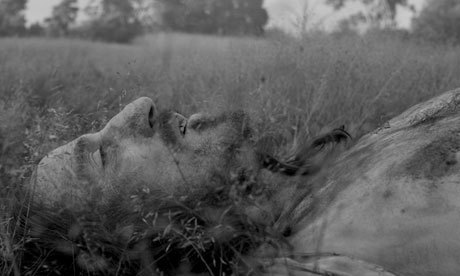
Even Sightseers, Wheatley’s most accessible film, is challenging viewing. And that’s all to the good. But you’d have to say that A Field is his most “difficult” work, despite feeling more formal in certain ways. It’s not going to be for everyone, and nor, one suspects, is Wheatley (until he sells out and directs an X-Men movie!), and there are moments here that descend, or ascend, into hallucinogenic experimentalism. It’s a history play only in that it cleaves to 17th century-sounding speech patterns and makes a backdrop of the Civil War against which our four deserters embark upon a misadventure into witchcraft.
Reece Shearsmith is impeccable as the scholar on the run from his master, the “coward” who cannot handle weapons who succumbs to the orders of Michael Smiley’s Irish alchemist. If I tell you that the other four men literally drag the talismanic Smiley into the field by pulling on a thick rope, you’ll have to run with it. This field is one from which there is no escape, ringed as it is by a forcefield of magic mushrooms that cannot be crossed. Shearsmith, who at one point seems to fall under Smiley’s spell and becomes a divining rod for buried treasure, is captive of a soldier who believes he can reach a fabled alehouse, but too gets distracted by Smiley’s promise of riches. You may not recognise actors Peter Ferdinando, Ryan Pope and Richard Glover, but you’ll have glimpsed all in various character roles (Ferdinando was in The Mimic; Pope in Ideal, which Wheatley directed; Glover in Sightseers), and all immerse themelves here, looking suitably mud- and shit-stained.
There is violence. There are visions. There is cruelty. There is scatology. There is humour. But how to categorise a film whose visual and thematic reference points – so exhaustively catalogued by Kim Newman in Sound & Sound – range from Peter Watkins’ Culloden to Witchfinder General? What Wheatley and his screenwriting/editing wife Amy Jump have created here is something new. How often does that happen in a medium that sometimes – like pop music – feels exhausted of possibility? I found myself transfixed, not just by the imagery, and the down-and-dirty acting, and the vast leaps between dots that refused to join up, but by the decision to have the actors form still-life tableaux, and by the music from Martin Pavey and Jim Williams, which blended ancient folk song with rumbling unease.
Wheatley’s career does not hinge upon the success of A Field In England, as it’s Film4’s pioneering experiment (or, more specifically, that of its innovative Film4.0 arm), not his, but the collision of one couple’s oddball vision and one company’s equally groundbreaking business plan, strikes me as vital and encouraging. (You know how much the current government hates the arts, except for the bits of the arts it does like? This feels like a bit they won’t ever like, and for that reason, it matters.)
While interviewing Simon Pegg, Nick Frost and Edgar Wright last week, we fell into discussion (for self-evident reasons) about films you could watch again and again. I watch a lot of films, and I have long concluded that some films are perfectly good, and not theft of two hours of your life, but at the same time you never need to see them again. Ben Wheatley’s films demand to be seen again.
It’s good to get that down in black and white.


July 3, 2013
Not Farming Today
 We apologise for the late arrival of this week’s Telly Addict; this is because the Guardian staff are on “Glastonbury time”. They’re the sunburnt ones, wandering about the corridors, looking lost and prodding the coffee machines, wondering what they could be. As it happens, I cover the Glastonbury coverage this week, or bits of it, on BBC2 and BBC3 (with special commendation to Lauren Laverne, Mark Radcliffe and Jen Long); also, the soapy season one finale of Nashville on More4; the supreme season six finale of Mad Men on Sky Atlantic; HBO’s Phil Spector TV movie on Sky Atlantic, in which Al Pacino atones for those awful Sky Broadband ads (can he need the money that badly?); and my new favourite documentary series, The Route Masters on BBC2.
We apologise for the late arrival of this week’s Telly Addict; this is because the Guardian staff are on “Glastonbury time”. They’re the sunburnt ones, wandering about the corridors, looking lost and prodding the coffee machines, wondering what they could be. As it happens, I cover the Glastonbury coverage this week, or bits of it, on BBC2 and BBC3 (with special commendation to Lauren Laverne, Mark Radcliffe and Jen Long); also, the soapy season one finale of Nashville on More4; the supreme season six finale of Mad Men on Sky Atlantic; HBO’s Phil Spector TV movie on Sky Atlantic, in which Al Pacino atones for those awful Sky Broadband ads (can he need the money that badly?); and my new favourite documentary series, The Route Masters on BBC2.


June 29, 2013
Writer’s blog: Week 26, Saturday

It’s been a while since I squeezed one of these in, but it seems opportune. I’m in Northampton for a couple of days at my folks’, but still working, still writing, still pitching. It’s Saturday. The photo above is misleading, for I am not in Glastonbury, nor wearing a fisherman’s hat. I really like this atmospheric shot; it was taken of me at dusk, along the main commercial thoroughfare to the Pyramid Stage by my brother-in-law Paul at Glastonbury 2009, which was my designated “mid-life crisis Glastonbury”. (You can read about it in excruciating detail here.) I loved every second of it. But I haven’t been since, and it’s conceivable that I’ll never go again, mainly because 2009 was so perfect in every way.
I’ve been thinking about it as I watch – or fast forward through – the Glastonbury 2013 coverage I’ve taped. (Hey, I have no interest in the Vaccines, or Rita Ora, or the latest wide-eyed BBC3 presenters being run in*, and I was ready for bed at 10.30 last night in any case.) I hadn’t been since 1995 when I went in 2009 so it was a special occasion, and uniquely family-oriented, in that I was convinced to go by my brother-in-law.
Though I am not at Glastonbury this year, due to media and social media saturation, I am acutely aware that the festival is ongoing, as I type. I do not wish I was there, in actuality, but I do sort of miss it somewhere in my bones. It’s somewhere you can go and get away with a hat, for a start. I hope everyone who is there is having an epic time. For fun, here’s a photo of me taken at Glastonbury 1990, my second ever Glastonbury, which was a filthy one, and the inaugural year of the festival’s dedicated Comedy Tent, where I spent the bulk of the long weekend. I loved that, too, although it had been too wet to realistically pitch our tent on arrival, so we slept in the car. I think I’m too old for that shit now.

It’s refreshing to get away from the fabled “hustle and bustle” of London – as I am doing by hopping it to the parental pile in Northampton – although I watched an episode of the BBC2 series The Route Masters: Running London’s Roads on Wednesday, which was all about life on London’s night buses and ought to have been enough to put anyone off moving to the capital, but, oddly, made me miss the place, and glad that I live there.
I’ve been resident of London for 29 years (minus the three where I moved out to Reigate by mistake), and although as you get older you’re inexorably drawn to a less stressful environment, I do find it hard to imagine living away from the smoke. And The Route Masters was a deftly captured – and slyly cast – snapshot of what makes the city simultaneously terrifying and joyful, with all sorts using the nocturnal bus service, which, since the relaxation of the licensing laws, really is an all-night proposition. I loved the Muslim driver Zajad, born and bred in London, who recounted being told by a fire-and-brimstone passenger that they were all going to hell: “I told him, we’re not going to hell, we’re going to Ilford.” Priceless.

When I lived in Streatham, in South West London – must have been late 90s – I was on the top deck of a bus, coming home late at night, and a stupid verbal misunderstanding between two male passengers led to one of them drawing a knife on the other. The man on whom the knife was drawn looked shocked and disappointed that it had come to this, and did not raise the aggression levels. It seemed a possibly idle threat, but when a young man is standing up pointing a knife at someone else, you tense up. Someone ran down the stairs and informed the driver, and he stopped the bus – handily, right outside a police station. Officers boarded the bus and escorted the knifeman off, with his large but friendly looking dog, as it happened. It was one of those ugly moments you experience in cities.
I watched half of Eye Spy on Thursday night on C4, the “moral dilemma” hidden-camera show “narrated by” Stephen Fry, although he makes an appearance too, as if to bind the format to him when frankly, he’s effectively just the voiceover artist, it’s not “his” programme. In it, situations are created that test the moral fibre of members of the public – £30,000 in cash left in a phone box, an actor playing a racist waiter in a small restaurant, a boy in a wheelchair at the bottom of some steps – and instead of these stunts being played out for our vicarious pleasure (except they are), they’re framed as a social experiment.

In brief, you get to see how much citizens of this country use the phrase, “What the fuck?”, which is an awful lot. I question the social efficacy of the format, but it did monitor how much racist abuse from a waiter diners will put up with, and you couldn’t help but feel proud of the Londoner who was first to stand up to the actor playing the racist waiter. (They did the same “test” in a restaurant in Manchester and not a single diner said a word. This is not conclusive proof that people in Manchester will put up with more racism than those in London, as it is not proof of anything.)
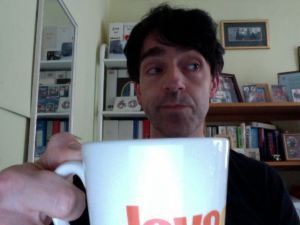
So, what have I been doing? Gathering my thoughts for a “corporate” next week. I’m hosting a series of Q&As at an “away day” for a large international media company, where various TV shows are previewed and their producers questioned before a large audience of delegates. I enjoy doing these gigs, as it means I get to meet executives from TV; people who make telly. These are the people I hope to be working with, and the reason I spend a lot of my time working for free – out of necessity – on pitches. I’ve been working on one today. At least the corporates help pay for the days when I’m not being recompensed for my time.
Next week’s busy, as I’m also interviewing Simon Pegg, Nick Frost and Edgar Wright about their new film The World’s End for Radio Times. The weird part of that is, I’ve only seen the first half of the film, as the second half isn’t going to be finished until the day after the interview! This can’t be helped, as my deadline is Wednesday. I really liked the first 45 minutes, by the way, but then I was bound to: it’s Simon Pegg, Nick Frost and Edgar Wright! Sometimes you can take a confident flyer. I am also meeting a producer about another scriptwriting project on the Friday, which is more unpaid work, but vital, as such connections lead to other connections, and writers exist in a permanent, cosmic join-the-dots puzzle, hoping to make those connections.
On a more paid note: yesterday, I delivered the second draft of a pilot sitcom script that’s in development with – I think it’s safe to say this – the BBC. That is, I delivered it – eg. emailed it – to the execs at the production company who are paying me to write it, and who will deliver it to the BBC, whose commissioning editor is paying them to pay me to write it. We all hope we will get paid some more money in order to write a lot more of it, with a view to actually making it into actual telly. So fingers crossed that the BBC will like it. I’ve certainly put a lot of time and effort into it, and so have my producers with their copious notes, and I really like the made-up characters I’ve invented and put into it. I could imagine writing five more stories for them, at least.
It’s good to see one’s family. While at my Mum and Dad’s, I get to see my brother, who lives about 40 minutes away in a less towny place, and his family, and dogs, and I get to see my sister, who lives five minutes away, and her family, and guinea pig. They’re good, my family.
I walked to the Weston Favell Shopping Centre this afternoon, for some fresh air and exercise, and I found it particularly hostile to pedestrians. It’s not clear which way you have to walk to get into it – and I speak as someone who lived in or near Weston Favell for the first 19 years of my life, and remember the mall when it first went up and was called the “Supacentre”. But it’s set behind a car park, a petrol garage, and a drive-thru McDonald’s, all of which rather suggest you ought really to pull yourself together and be in a car.

Ah! The official website gives directions only to people planning to “get here” by car or bus. There is no official pedestrian route to it. Well, there is, as I managed it somehow, but only by crossing lots of roads and going the long way round. (There’s a pretty scary looking “walkway” but this only works if you are walking from the direction of Standens Barn; I would have had to cross a road to get to it, which rather defeats the object.) When did Britain become America, and when did Northampton become LA?
Still, at least I’m not at Glastonbury!
 *Incidentally, before I get back to work, I should add that I encountered, for the first time, a young presenter on BBC3’s Glastonbury coverage called Jen Long, whose energy and fluency and ability to hit her mark, in a field, were commendable. I thought she was great. I’ve looked her up and she’s on Radio 1 in the night, and she runs a fanzine, and she used to do Introducing on BBC Wales. I expect great things of her.
*Incidentally, before I get back to work, I should add that I encountered, for the first time, a young presenter on BBC3’s Glastonbury coverage called Jen Long, whose energy and fluency and ability to hit her mark, in a field, were commendable. I thought she was great. I’ve looked her up and she’s on Radio 1 in the night, and she runs a fanzine, and she used to do Introducing on BBC Wales. I expect great things of her.


June 25, 2013
The return
 In this week’s Telly Addict, I find myself returning to a number of shows I’ve previously assessed at the outset: The Returned on C4, which is proving to be the best thing currently on TV, now at Episode 3; The Americans on ITV, which hit a post-pilot dip but has found its feet again at Episode 4; and Oliver Stone’s Untold History of The United States, which reached a new pitch of alternative-narrative chest-beating in the final of its ten episodes on Sky Atlantic. Also, a new season of The Borgias on Sky Atlantic, a dip into Question Time, aka #bbcqt, on BBC1 to see how Russell Brand fares, and a nice moment from the new run of Marple on ITV, involving Ian Fleming and Charlie Higson.
In this week’s Telly Addict, I find myself returning to a number of shows I’ve previously assessed at the outset: The Returned on C4, which is proving to be the best thing currently on TV, now at Episode 3; The Americans on ITV, which hit a post-pilot dip but has found its feet again at Episode 4; and Oliver Stone’s Untold History of The United States, which reached a new pitch of alternative-narrative chest-beating in the final of its ten episodes on Sky Atlantic. Also, a new season of The Borgias on Sky Atlantic, a dip into Question Time, aka #bbcqt, on BBC1 to see how Russell Brand fares, and a nice moment from the new run of Marple on ITV, involving Ian Fleming and Charlie Higson.


June 21, 2013
Keeping up appearance fees
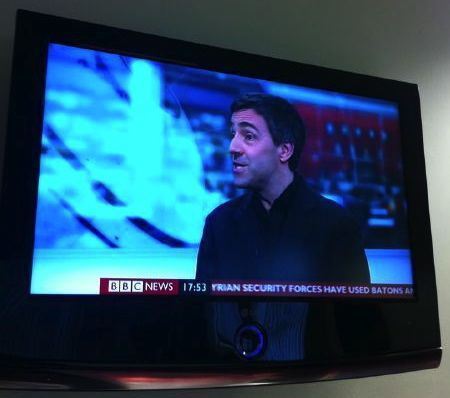 When you see somebody talking on the telly, do you assume they have been paid? You are right to. Unless they are a member of the public whose opinion or testimony has been sought by a news crew, or an audience member doorstepped by the host on an audience show, or they are questioned in a news studio as a representative of either a political party or a private company, then they will usually be paid an appearance fee.
When you see somebody talking on the telly, do you assume they have been paid? You are right to. Unless they are a member of the public whose opinion or testimony has been sought by a news crew, or an audience member doorstepped by the host on an audience show, or they are questioned in a news studio as a representative of either a political party or a private company, then they will usually be paid an appearance fee.
This will be nominal, but it covers their time and their expertise, and reflects the fact that – like an actor in a drama, or a singer or dancer in a chorus – they have helped to make a TV programme, and without them there would be a person-shaped gap, which will never do. TV programmes have budgets, and from those budgets, fees for actors, singers, dancers or contributors are found. (It goes without saying that there are many, sometimes hundreds of people you don’t see on the telly who are just as vital to the making of the programme, and they will be paid too, but this will effectively be a non-appearance fee.)
However, it ain’t necessarily so. Because James Gandolfini sadly died, I was contacted yesterday morning, by email – via the Guardian as it happens – by a broadcaster who requested my presence on a live studio discussion about Gandolfini, to take place at 4pm yesterday afternoon. Having just gathered my thoughts sufficiently to write a blog and be filmed for the Guardian video obituary, I felt confident I could make a good contribution to this show.
However, having agreed on principle with the producer to be at the studio for 4pm (which just happened to be geographically between the British Library, where I was writing, and 6 Music, where I was headed for an appearance on Roundtable, so it was all awfully convenient and meant to be), I was then told, “It’s not actually our policy to pay guests.”
Without wishing to come across as some kind of bread-head, I rather insisted that I would expect some recompense for my time and expertise, and after a couple more emails, during which the producer went to their editor and came back, we hit an impasse, at which the producer said, “We’re going to have to go with someone else.” This meant somebody who didn’t require paying. Fair enough. I had pushed for payment and they’d called my bluff. To be honest, it was one less extra thing to think about. I am currently writing a second draft of a pilot sitcom script to a deadline after all, and I’m being paid for that.
Having worked for 25 years in the media, I would say I have a realistic view of my own importance. I do not delude myself. But I do believe the mileage on my clock gives me a degree of authority and I like to think I can string a sentence together on a good day. I cannot build a wall or fix a radiator but I can talk. A tradesperson is rightly seen as someone who is paid for their time and expertise. If you can plaster a wall yourself, you have no need to call in a plasterer; if you can’t, you must expect to pay them for the work, and they must be expected to do that work to a certain standard in return.
I once entered some provisional talks with a small, independent publisher about publishing my “selected works” in a book. It never happened, but I had a title: Punctual. I have always been proud to be reliable, to write to length, and to deadline, to turn up on time, and to call ahead if unable to do so. These boring qualities go a long way in showbiz. (I have heard of certain performers who are apparently a nightmare to work with, but you have to be pretty bloody good at your job to get away with this.) I have never fooled myself into thinking I’m some kind of literary, verbal or televisual genius, to whose door broadcasters will constantly be beating a path.
Now, if I had accepted the no-fee and given my two penn’orth to the broadcaster today at 4pm, here’s what would have happened:
My face would have been on the telly.
Some people might have seen it.
The whole thing would have lasted a matter of minutes (which, when you build in the travel at either end, plus the buffer of some green-room waiting time, makes the appearance a tiny percentage of the time and effort expended).
The broadcaster might have used me again in the future and on that occasion maybe even paid me.
Also, I suspect, if you’d seen it, you would have assumed I’d been paid. But I wouldn’t have. It would have been voluntary work, except not voluntary work for a worthy cause.
I declined, politely. So I wasn’t on. I kind of wonder who was? But it doesn’t matter. The world kept on turning. But what right does a broadcaster ie. employer or client, have not to pay for honest work? Every TV show you watch will probably have interns working, often unpaid, on the first rung of a TV career, but that is their decision, and a time-investment in exchange for “work experience”, which can be invaluable. Also, you get free coffee and get to work on a TV programme. Me? I’m 48. I don’t care about free coffee and I’ve seen hundreds of TV programmes being made. I have written some of them, and been in some of them. I no longer need the work experience.
Richard used to take the piss out of me for screen-grabbing my occasional TV appearances, but these are my work. I don’t have a library of tapes, but I do have some grabs. Plus, they’re fun to look back at.

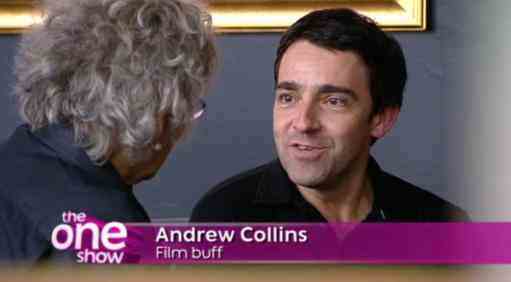


I didn’t get paid to be on Mastermind, of course – my appearance fee went to charity. Typically, they paid for my train fares. This is weird only when no fee is forthcoming. The broadcaster who wouldn’t pay my fee yesterday offered a car there and back. What a waste of money. It’s nearly always easier, and quicker, to get about London on public transport. Why would I want to be in a slow-moving car? Think of all the money they could save by not running a private car hire service. Pay contributors with that instead!
So, what else could I hope to gain from a brief, unpaid slot on a news programme? An ego boost? Those who still think I am on the telly all the time as a pundit or “talking head” may assume I have some need to be seen in pubic. I don’t. I may once have been excited by it. But not any more. This is why I have consciously scaled back on the frequency with which I say “yes” when asked to appear on stuff. Because my mobile number is on some general BBC contributors’ list somewhere, and I haven’t changed it for a long time, I am called up by researchers looking comments all the time. I decline almost all of these requests, as I find they take up more time than they are worth in nominal appearance fees. (When I used to write books, I would appear on anything in order to promote them – you do not expect a fee in this instance.)
If I was on the staff of the Guardian, or Radio Times, I might happily be ferried to a TV studio for an hour or two, just to get out of the office, but I’m not on the staff of anything. (I explained this to the producer who wanted to not pay me yesterday, so there was no confusion.)

It’s a burning issue in the media. Barney Hoskyns, the august music scribe and curator of Rock’s Back Pages, has started a campaign for media freelancers called Stop Working For Free, whose Facebook page is here. (I can’t access it as I’m not a Facebook member, but you might be.) While people with “proper” jobs might think that media work is cushy and “a laugh” – which to a degree it can be – it is still work: a case of time taken and effort and expertise expended, both of which should by rights be recompensed, by verbal or written agreement with the employer. I’ve complained before about how much free work – “on spec” – you must do as a writer, and how many meetings you must attend for no financial return or “call-out fee”. You accept this as part of the world you work in. But exploitation is never far round the corner, as Barney’s manifesto makes plain:
STOP WORKING FOR FREE.
Calling all freelance content providers (musicians, writers, actors, photographers, designers etc): Join me in WITHDRAWING UNPAID LABOUR from the creative and media industries. The exploitation of freelance content providers has gone on too long, and we are all responsible for letting it happen.
Things have got much worse in the digital age, of course, where images and words are shared around as if nobody is responsible for them. (Hey, I write a blog; I bet at some point I have used a photo that an agency, and therefore a photographer, should be paid for. I do my best not to, but it’s a wild west, isn’t it?) As a creative person who gives a lot of writing away for free – which is my choice – I feel I am on the moral high ground, but there’s a lot of grey here.
I would be interested to hear from people in and outside this weird industry. How do you feel about anybody working for nothing?
In the meantime I’ll leave you with more of Barney’s stirring words:
If you allow yourself to be seduced by the myth that your unpaid labour will “look good on your CV” (or equivalent blah), please try to see that you jeopardise not only the welfare of your replaceable elders but your OWN long-term economic future. You set up a paradigm whereby you in turn become replaceable.


June 20, 2013
Don’t stop believing
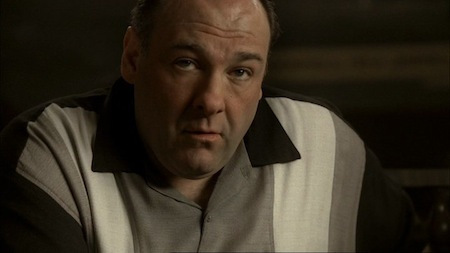
We don’t know if Tony Soprano died. Let’s say he didn’t. Last seen eating dinner with his family in a local New Jersey diner to the chosen tune of Don’t Stop Believin’ in the aftermath of a mob war, he saw a man enter the restroom, his daughter Meadow arrive, at which he looked up and the screen went to black for ten seconds before the final credits rolled. We had no reason to think that Tony Soprano died, having watched him move like a bulletproof Buick through 87 hours of supreme television fiction over six years. He was a big man but he was in bad shape; you could outrun him, but he would catch you in the end.
We had Tony Soprano down as indestructible, immortal, qualities we probably bestowed upon James Gandolfini the actor who played him, and who has died of a heart attack, in Italy, aged just 51. Much discussion has taken place about the final scene of The Sopranos. I reviewed the final episode here. But now that Gandolfini has reached his season finale, we might remind ourselves of that Journey lyric.
Working hard to get my fill,
Everybody wants a thrill
Payin’ anything to roll the dice,
Just one more time
Some will win, some will lose
Some were born to sing the blues
Oh, the movie never ends
It goes on and on and on and on
If there is a TV Valhalla, some marbled hall where only the medium’s immortals congregate, we can be certain that Tony Soprano, as played by James Gandolfini, is already among those Gods, taking his bulky place between JR Ewing, Hawkeye Pierce, Homer Simpson and The Fonz (and if that sounds facetious, it’s anything but). Clearly, Tony would never have existed without creator David Chase, but Gandolfini literally put flesh on those bones. A generous helping of flesh.
What’s most haunting in the immediate aftermath of Gandolfini’s passing is the way we listened to him breathe for all those years, that nasal wheeze increasing when Tony was stressed, a signal sent from deep within his workings that all was not smooth. The laboured breathing was a key facet of Tony’s character; he was not a man you could easily knock over, but he was mortal, always. If he stopped breathing, we would know about it.
Heavy set when The Sopranos made him a household name – within about ten minutes of the first episode starting, possibly from his first walk down that drive – Gandolfini’s skill and presence had already been noticed by the talent-spotters among us for supporting parts in films like True Romance, Crimson Tide, 8mm and Fallen. In movie parlance these were “character” parts. He was not a “leading man”, by dint of his shape. He carried an awful lot of weight, but this was required on the voyage of Tony Soprano, as the mob boss and family man seemed to be carrying all the trouble in the world on what looked like a gone-to-seed ex-prizefighter’s frame, as if, again, those burdens were made flesh.
We lived through those panic attacks with him, so full-blooded and corporeal was Gandolfini’s acting, as delicate and nuanced as he seemed bulky and unyielding. Gandolfini built him up but nobody could knock him down. There is little in TV’s great history to match it. It was Michael Corleone’s wife Kay who, in The Godfather Part III, uttered the devastating line, “I dread you.” We all dreaded Tony Soprano, and yet could not take our eyes off him, week after week, year after year. His temper was on a hair’s trigger, a Tasmanian Devil’s dervish of violence nearly always preceded by a grin, or a squint of death.
Gandolfini’s features were set like tiny pebbles on a vast beach of a face, but what complex emotions he could rearrange them into. It’s a commonplace to say that an actor inhabits a character. Gandolfini was a sitting tenant. He was just as much Tony Soprano when disconsolately peeling slices of bresola off the greaseproof paper at that monolithic fridge as when meting out rough justice to some insubordinate on the pavement with a staple gun or his ham-like fists.
It was a masterstroke of storytelling to have Tony’s entire arc prefigured by the flight of some ducks from his swimming pool, but rewatch that early sequence again and see how much wordless pathos and existential fear Gandolfini builds in, that bowling ball face shifting from simple delight to mortal terror. The dressing gown, the flip flops, the vest, the bowling shirts, these were his sartorial tics, but they alone did not maketh the man. In Tony Soprano, Gandolfini found immortality, all the more remarkable for doing so from the rarefied outfield of cable television. His face was not beamed into every American home like Hawkeye’s or Kramer’s or Archie Bunker’s or Mary Tyler Moore’s. It’s rare that an actor gives himself over so fully to a fictional construct, but Gandolfini did that.
Thanks to the medium that made him, he will never leave us.
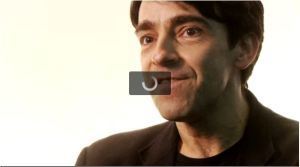 PS: I was pleased to be able to articulate some of the same feelings for this Guardian video obit, also featuring Andrew Pulver on his films, which we shot this morning.
PS: I was pleased to be able to articulate some of the same feelings for this Guardian video obit, also featuring Andrew Pulver on his films, which we shot this morning.


June 19, 2013
Scrap, metal

I’ve never actually been beaten to a pulp in real life, so I can only guess what it must feel like. But I think it might feel like watching the final third of Man Of Steel. It’s a reboot – which is a clear, unequivocal vote of no confidence in that last reboot, which only reached one film – and it’s also an “origins” story. That makes it fundamentally a remake of the first Superman movie, a committee-written affair in 1978, but brought to fruition in colourful, then-groundbreaking style by Richard Donner.
Now, it’s at this point that I must declare an emotional-historical stake in the cinematic birth of Superman: it was our big Christmas movie of that year, I was 13, and it came hot on the heels of Star Wars; it felt, for all the world, as if big, blockbuster cinema was ours. (Remember, we’d only had re-runs of the “Ker-Pow!” live-action Batman and the animated Spider-Man on TV.) My friend Neil Stuart somehow managed to get his hands on an official Superman movie programme, perhaps from a screening in London? (I don’t know how, but I do know we looked up to Neil.) He generously gave it to me. I treasured it. I was that kid who would badger my parents for the flimsy tie-in book of each new blockbuster: the ’76 King Kong, Close Encounters etc. I was at the stage in any nerd’s life in those pre-Internet days when the need to find stuff out and see pictures of stuff and, if possible, own that stuff was overwhelming.
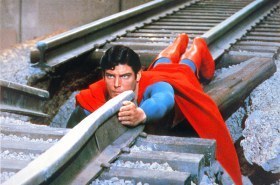
My friends and I were caught up in the hype and we were more than ready to “believe a man could fly”, as per the marketing promise. (I had also decreed Gene Hackman to be My Favourite Actor, so I was stoked by the idea of seeing his latest movie when it came out, rather than on telly a number of years later.) I was equally enthused about Superman II in 1980 and Superman III, which my brother and I dashed to see in 1983 as we were confirmed Richard Pryor fans by then. The law of diminishing returns did not diminish our desire to return to the Northampton ABC.
So, every time Superman is rebooted, I recoil a little bit and lose some of my strength, just as I do each time the original Star Wars trilogy is ruined by George Lucas. They’re punching my childhood. That said, I am a grown man. And if a reboot is good, I’ve nothing against it in principle. Batman Begins was truly terrific, the best of Christopher Nolan’s trilogy. Although it came way too soon, I found much to admire in The Amazing Spider-Man last year. Conversely, I was unmoved by Bryan Singer’s Superman Returns, with some people called Brandon Routh and Kate Bosworth in it as Clark and Lois. (I never watched Smallville.) I had no objection to Zack Snyder having another crack at the man of steel, as I have an awful lot of time for his Watchmen.

Unfortunately, Man Of Steel is awful. It sucks the life out of the franchise and jumps up and down on any of the first movie incarnation’s charm or humour. (It goes without saying that Man Of Steel is not camp. Even its trademark blue and red are dirty blue and matt red. There are two jokes; I counted them.) This overlong, over-serious, portentous sheet-metal opera seems to have only one setting: eleven. If it was ever satisfactorily wrought, then they must have taken it back in fear and wrought it some more. In the boxing-gloved hands of Dark Knight – and, let’s not be coy, Da Vinci’s Demons – scribe David S Goyer, and the bombast-worshipping Snyder, this new Superman is a charcoal-coloured, bass-note, quasi-biblical apocalypse. And that’s just the opening sequence.
From the destruction of Krypton, we move into a sombre, po-faced re-telling of Kal-El’s evacuation to Earth. Kevin Costner and Diane Lane make a good set of adoptive parents, but The Tudors‘ Henry Cavill, who physically fills the part, has little to play with. His son of Krypton gets bullied, learns the hard way not to show his strength and works out how to “focus” the cacophonous hell his super-senses create inside his head, before becoming a sort of itinerant oil-rig worker so that he can seek out a crashed spaceship in the Arctic?
Not 100% sure about what was going on during this bit, which is where he fortuitously meets and reveals himself to an unconvincing Lois, whose pushy reporter Amy Adams has to work furiously to pump any life into. A Superman film shouldn’t be boring, should it? But I certainly nodded off while Russell Crowe was delivering a lecture in holographic form, and when I awoke, he was still delivering it.
But the meat of the story isn’t Clark’s evolution to a super man (they don’t call him that much, and the “S” on his chest doesn’t stand for “Superman”, so there), it’s his never-ending cosmic grudge match with Michael Shannon’s General Zod, who’s a kind of intergalactic thug whose superpowers match Kal-El’s, hence the climactic battle (or “smackdown” as it’s been more accurately described), which goes on and on and on and on and on. And then, just when you think that Metropolis couldn’t take any more of a beating as these two supreme beings punch each other a mile away at a time, it goes on for a bit longer.
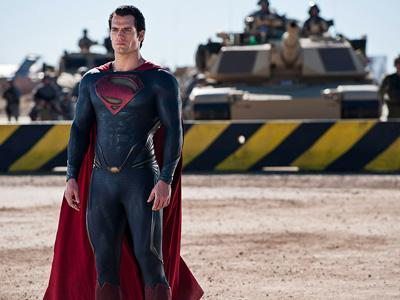
Huge, looming spaceships, a honking “world engine”, entire skyscrapers falling onto other skyscrapers, more military hardware than you’ve ever seen before, airstrikes, explosions, everything’s massive, everything’s an attack … Transformers springs to mind; as does the first Hulk, whose comedic bouncing style also seems to have been adopted, and that’s not a good look. (Unless you just want to squeeze as much money out of teenage boys as possible, in which case, why make it 143 minutes long? Cut the gooey stuff and make it all battle and run it in at 106 minutes! Cram more screenings in.)
Like any good reboot, it sets up Clark and Lois as fellow reporters for the ultra-modern Perry White, who’s black, so that further episodes can be stacked around them, but if this is how it starts, with what magnitude of a bang is it going to end? And how long with Man Of Steel III be?
Sometimes I think to myself: I just wasn’t made for these times. Superman certainly wasn’t. (I willingly saw it in 2D, by the way. I can only assume in 3D it’s literally unbearable to be in the same room as.)


June 18, 2013
Whiter than white
 Just as the vegetable-growing year has a “hungry gap” in spring, when very little comes up, so, new produce in the TV year tends to drop off around now. As noted in the new, seasonally adjusted Telly Addict, Game Of Thrones, The Fall, Mad Men, The Good Wife, Nashville, all are either done, or close to being done, having been launched in either the autumn or the winter, when people watch telly and don’t go on holiday or sit in the garden or outside a pub in the evening. However, UK-Belgian epic The White Queen is here to save us for the next ten Sunday nights on BBC1; also this week, BBC2′s scientifically pointless but cat-filled Horizon: The Secret Life Of The Cat; Dates on C4; and the triumphant takeover of The Daily Show With Jon Stewart on Comedy Central by John Oliver from these islands (and from the same management as me). The British are coming. And some Belgians.
Just as the vegetable-growing year has a “hungry gap” in spring, when very little comes up, so, new produce in the TV year tends to drop off around now. As noted in the new, seasonally adjusted Telly Addict, Game Of Thrones, The Fall, Mad Men, The Good Wife, Nashville, all are either done, or close to being done, having been launched in either the autumn or the winter, when people watch telly and don’t go on holiday or sit in the garden or outside a pub in the evening. However, UK-Belgian epic The White Queen is here to save us for the next ten Sunday nights on BBC1; also this week, BBC2′s scientifically pointless but cat-filled Horizon: The Secret Life Of The Cat; Dates on C4; and the triumphant takeover of The Daily Show With Jon Stewart on Comedy Central by John Oliver from these islands (and from the same management as me). The British are coming. And some Belgians.


June 14, 2013
Campaign for real whale

On July 26, the documentary Blackfish is released in UK cinemas. It is one of the most heartbreaking films I have ever seen. It tells the tragic tale of one specific captive killer whale, Tilikum, a 22.5 ft (6.9m) long, 12,000 pound (5,400 kg) bull who lives – if you can call it living – at SeaWorld in Orlando, Florida, where he still performs for whooping audiences. His name comes from the Chinook word for “friends, relations, tribe, nation, common people”, which is ironic when you think for longer than a few seconds about the fact that whales in swimming pools are by definition separated from their extended families. (Tilikum was captured in 1983 off the coast of Iceland, aged around three years old, and has lived in swimming pools for most of his showbiz life. While held at Sealand in British Columbia, his first “home”, he and two other orcas were herded, every night, into a “holding” pool just 20 ft (6.1m) deep and 28 ft (8.5m) in diameter.)
Blackfish was made by documentarian Gabriela Cowperthwaite, who did not start out with an agenda. She had, in fact, taken her kids to SeaWorld and bought into the whole corporate myth that these beautiful cetateans are not “forced” to perform their tricks and do so willingly out of a love for their human trainers. (The word “killer” is usually dropped in the official commentaries at these shows.) Having done the same thing myself in 1994, no matter how conflicted I felt at the time about seeing two whales doing tricks for fish at what was then Marine World Africa USA in Vallejo, California, it has haunted me ever since and hardened my anti-zoo stance. I guess I am the choir to which the film could be accused of preaching to, although it’s hard to imagine why any right-thinking person would be happy about large, social marine mammals being kept in prison when they’ve committed no crime.
The orca is an apex predator, but has never attacked a human in the wild. Incidents of whales “turning on” their trainers, however, are more common than you might idly think. The engine that drove Gabriela to make her film was the awful death on February 24, 2010, of experienced trainer Dawn Brancheau at Orlando, which was witnessed, unknowingly, by a whooping audience. The precise cause of death is still murky, but Brancheau seems to have been pulled by Tilikum into the water by her ponytail, possibly in a moment of confusion over fish.
The whales performing on that occasion had been unresponsive and agitated, and only get fish after successfully effecting a trick, so they were especially hungry. Eyewitness accounts differ. Brancheau’s autopsy indicated “death by drowning” and “blunt force trauma”, and noted a severed spinal cord, and “sustained fractures” to her jawbone, ribs and a cervical vertebra.
SeaWorld was fined $75,000 by the Occupational Safety and Health Administration but insists that OSHA’s findings are “unfounded”. The implication, as ever in cases like this, is that human error led to the tragedy. This was the story instantly spun around the death at a Cumbrian safari park of zookeeper Sarah McClay, killed by a Sumatran tiger. The news media ensures that our first reaction to the story is never, “What is a tiger doing living in Cumbria?”

You will learn more about all this in the haunting film, which provides plentiful context: historical, behavioural, neurological (orcas have a section of brain that even clever old humans don’t have) and, yes, emotional. It may make you cry. I met Gabriela on Tuesday night at a private VIP screening of Blackfish laid on by distributor Dogwoof for representatives of various NGOs and activist groups (you might say a “captive audience” if the phrase wasn’t so inappropriate!) and she is a calm, logical, unhysterical advocate of basic commonsense in this area. Here she is.
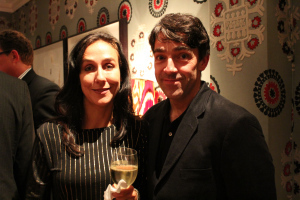
In her film, she speaks to a whole parade of ex-SeaWorld trainers, who confirm that incredible bond between animal and human, but who still question the motivation behind SeaWorld’s entire business model. The marine park chain currently has 22 killer whales in captivity, which remain big box office. For them, it’s all about money and turnstiles. And why wouldn’t it be? They’re a corporation. Blackfish is as much a critique of corporate America as it is of animal cruelty. (You won’t be surprised that SeaWorld refused to put up a representative to speak on camera, although transcripts of their defence at a previous court case speak volumes.)
I refrain from urging anyone to see a film. There may be issues closer to home than Orlando that come higher up your priority list. You may simply think: well it’s obviously wrong that massive whales are kept in a zoo, I don’t need to see a film about it to have my beliefs hardened. It’s not a snuff movie – you don’t actually see any trainers die, but you do see the bloody damage distressed whales do to each other when cooped up, and you do see some unprecedented “behaviours” which rather suggest psychological damage. Poor Tilikum seems mostly to be kept as a sperm bank these days. (He’s “sired” 21 offspring in his time, 11 of which are still alive.)
Artificial insemination is a common practice in animal husbandry, on farms, at stables, in zoos and elsewhere, and it’s done for reasons of conservation as well as commerce. However, you might find the sheer scale of doing it to a killer whale rather disturbing. Maybe that’s double standards, I don’t know, but I love killer whales. When I saw one in Vallejo in 1994 and sat right up against the glass of its viewing pool while it swam past my nose, I felt privileged to have seen it. And then sick that I had seen it in that unnatural setting.
I have a recurring dream which I’ve mentioned before, in which I am close to the edge of a pool in which huge killer whales are swimming. But it’s not a nightmare. I am terrified of falling in, and in awe of the whales, but I never do fall in, and they never harm me. No need to analyse that one, Freudians.
Oh, and I urge you to see Blackfish. Damn!


Andrew Collins's Blog
- Andrew Collins's profile
- 8 followers




